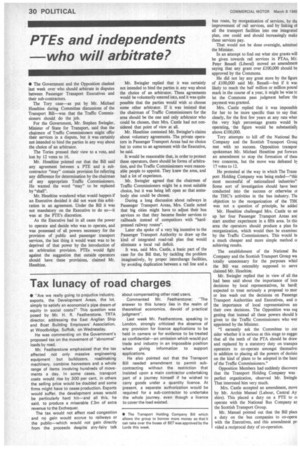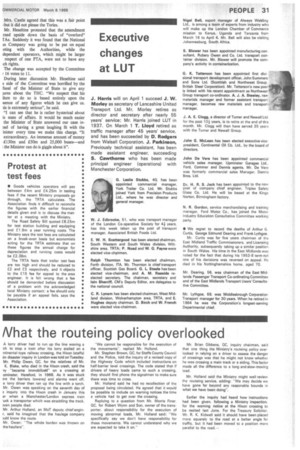PTEs and independents who will arbitrate?
Page 32

Page 33

If you've noticed an error in this article please click here to report it so we can fix it.
• The Government and the Opposition clashed last week over who should arbitrate in disputes between Passenger Transport Executives and their sub-contractors.
The Tory case—as put by Mr. Michael Heseltine during Committee discussions of the Transport Bill—was that the Traffic Commissioners should do the job.
For the Government, Mr, Stephen Swingler, Minister of State for Transport, said that the chairmen of Traffic Commissioners might offer their services in a dispute, but it was certainly not intended to bind the parties in any way about the choice of an arbitrator.
The Tories pressed their view to a vote, and lost by 12 votes to 16.
Mr. Heseltine pointed out that the Bill said any agreement between a PTE and a subcontractor "may" contain provision for referring any difference for determination by the chairman of any appropriate Traffic Commissioners. He wanted the word "may" to be replaced by "shall".
Mr. Heseltine wondered what would happen if an Executive decided it did not want this arbitration in an agreement. Under the Bill it was not mandatory on the Executive to do so—it was at the PTE's discretion.
As the Executive had in all cases the power to operate and decide who was to operate, and was possessed of all powers necessary for the provision of public and passenger transport services, the last thing it would want was to be deprived of that power by the introduction of an arbitration provision. PTEs would fight against the suggestion that outside operators should have these provisions, claimed Mr. Heseltine. Mr. Swingler replied that it was certainly not intended to bind the parties in any way about the choice of an arbitrator. These agreements would be voluntarily entered into, and it was quite possible that the parties would wish to choose some other arbitrator. If it was insisted that the chairman of Traffic Commissioners for the area should be the one and only arbitrator who could be chosen, then Mrs. Castle had not considered that point of view at all.
Mr. Heseltine contested Mr. Swingler's claims about voluntary agreements. The private operators in Passenger Transport Areas had no choice but to come to an agreement with the Executive, he said.
It would be reasonable that, in order to protect these operators, there should be forms of arbitration, and the Traffic Commissioners were reasonable people to appoint. They knew the area, and had a lot of experience.
Mr. Swingler agreed that the chairmen of Traffic Commissioners might be a most suitable choice, but it was being left open so that somebody else could be chosen.
During a long discussion about railways in Passenger Transport Areas, Mrs. Castle noted that big cities might have to adjust their bus services so that they became feeder services to railheads instead of competitors with "hardpressed railway routes".
Later she spoke of a very big incentive to the Passenger Transport Authority to draw up the kind of integrated road-rail plan that would eliminate a local rail deficit.
It was, said Mrs. Castle, a basic part of the case for the Bill that, by tackling the problem imaginatively, by proper interchange facilities, by avoiding duplication between a rail line and a bus route, by reorganization of services, by the improvement of rail services, and by linking of all the transport facilities into one integrated plan, one could and should increasingly make these services pay.
That would not be done overnight, admitted the Minister.
In an attempt to find out what size grants will be given towards rail services in PTAs, Mr. Peter Bessell (Liberal) moved an amendment saying that any grant over £100,000 should be approved by the Commons.
He did not lay any great store by the figure of £100,000 said Mr. Bessell—but if it wa. likely to reach the half million or million pound mark in the course of a year, it might be wise tc let the Commons pass judgment before the payment was granted.
Mrs. Castle replied that it was impossible for her to be more specific than to say that clearly, for the first few years at any rate wher the very high percentage grants would be operating, the figure would be substantial]) above £100,000.
Tory attempts to kill off the National Be Company and the Scottish Transport Grout met with no success. Opposition transpor spokesman Mr. Michael Heseltine put forwan an amendment to stop the formation of that two concerns, but the move was defeated b,1 17 votes to 12.
He protested at the way in which The Transport Holding Company was being ended—"thil most successful of nationalized industries" Some sort of investigation should have beer conducted into the success or otherwise 01 the THC's activities in the bus industry. The objection to the reorganization of the THC was not a question of principle, he added Mr. Heseltine challenged Mrs. Castle to set up her four Passenger Transport Areas anc start another experiment in a fifth area. In thiE area the operators should produce a plan for reorganization, which would then be examinee by the Traffic Commissioners. This would be a much cheaper and more simple method a achieving results.
The establishment of the National Bu Company and the Scottish Transport Group wa totally unnecessary for the purposes whicl the Bill was ostensibly supposed to serve claimed Mr. Heseltine.
Mr. Swingler replied that in view of all tha had been said about the importance of loca decisions by local representatives, he hard]: expected to treat seriously a proposal to mor or less wash out the decisions on Passenge Transport Authorities and Executives, and o.
the importance of local representatives an their own decisions. The Opposition was sug gesting that instead all these powers should b given to the Traffic Commissioners who wer appointed by the Minister.
"I earnestly ask the Committee to cor sider whether it is serious at this stage to sugge: that all the teeth of the PTA should be draw and replaced by a statutory duty on transpot operators to co-operate amongst themselve: in addition to placing all the powers of decisio on the kind of plans to be adopted in the hanc of the Traffic Commissioners."
Opposition Members had suddenly cliscovere that the Transport Holding Company was perfect organization, observed Mr, Swingle That interested him very much.
Mrs. Castle accepted an amendment, move by Mr. Archie Manuel (Labour, Central Ay shire). This placed a duty on a PTE to cc operate with the National Bus Company ar the Scottish Transport Group.
Mr. Manuel pointed out that the Bill place a duty on the bus companies to co-opera with the Executives, and this amendment pr vided a reciprocal duty of co-operation. Mrs. Castle agreed that this was a fair point -but it did not please the Tories.
Mr. Hesekine protested that the amendment rned upside down the basis of "overlord" rAs. Suddenly it was found that the National Is Company was going to be put on equal oting with the Authorities, while the dependent operators, which might be larger respect of one PTA, were not to have any .ch rights.
The change was accepted by the Committee '16 votes to 11.
During later discussion Mr. Hesekine said s side of the Committee was horrified by the fusal of the Minister of State to give any ;tires about the THC. "We suspect that his ilure to do so is based entirely upon the mence of any figures which he can give us. its is extremely serious", he said.
"I can see that he is rather hysterical about is state of affairs. It would be much easier the Minister of State answered our case inad of having a great laughing fit with the mister every time we make this charge. "It extraordinary. An immense amount of money -£130m and £50m and 25,000 buses—and . the Minister can do is giggle about it".




































































































































